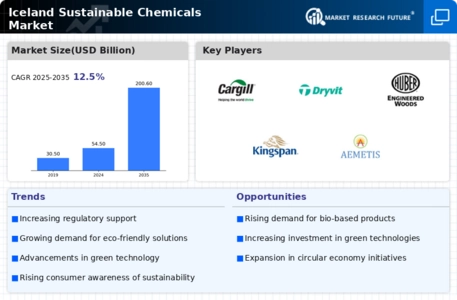Top Industry Leaders in the Iceland Sustainable Chemicals Market

Iceland, the land of fire and ice, is forging a new path in the chemical industry – one paved with sustainability. Leveraging its abundant geothermal and hydropower resources, the country is emerging as a leader in the production of eco-friendly chemicals, attracting global attention and fierce competition. This report delves into the competitive landscape of the Iceland Sustainable Chemicals Market, analyzing strategies, market share determinants, industry news, and recent developments.
List of Strategies Adopted:
Harnessing Geothermal Power: Icelandic companies leverage the country's abundant geothermal and hydropower resources to power their production processes, minimizing reliance on fossil fuels and reducing their carbon footprint. This not only attracts environmentally conscious customers but also positions them as frontrunners in green chemistry.
Circular Economy Principles: Iceland's sustainable chemicals sector is built on the pillars of reuse, recycle, and reduce. Companies are developing innovative technologies to extract maximum value from raw materials, minimize waste generation, and close the loop on the product lifecycle. This not only conserves resources but also fosters a sustainable business model.
Bio-based Feedstocks: Embracing bio-based alternatives to fossil fuel-derived chemicals is crucial for market success. Icelandic companies are actively researching and developing processes for producing bio-alcohols, bio-acids, and bio-polymers from renewable sources like algae, biomass, and agricultural waste.
Collaborative Innovation: Iceland fosters an environment of collaboration between government, academia, and private players. Research institutions like the University of Iceland and the Icelandic Institute for Sustainability are partnering with companies like Cargill and Mitsubishi Chemical to develop cutting-edge technologies and commercialize sustainable chemical solutions.
Market Focus and Differentiation: Icelandic companies are strategically targeting specific markets and applications. Some focus on high-value niche chemicals for the pharmaceutical or food industries, while others cater to large-volume markets like construction or packaging with sustainable alternatives to traditional chemicals.
Factors for Market Share:
Technology Leadership: Possessing proprietary technologies for efficient and cost-effective production of sustainable chemicals is a key differentiator. Companies with strong R&D capabilities and a focus on intellectual property protection are poised to gain market share.
Sustainable Sourcing and Supply Chains: Transparency and traceability in sourcing raw materials and ensuring the sustainability of supply chains are becoming increasingly important factors for customers. Icelandic companies with strong partnerships with local farmers and renewable energy providers can leverage this advantage.
Cost Competitiveness: While sustainable chemicals may initially be priced higher than their conventional counterparts, achieving cost parity through efficient production processes and economies of scale is crucial for long-term market penetration.
Regulatory Landscape: Navigating the evolving regulatory landscape for sustainable chemicals is essential. Companies that actively engage with policymakers and stay ahead of the curve in terms of compliance will be well-positioned to capitalize on emerging opportunities.
Key Companies in the Sustainable Chemicals market include
- Cargill Inc.
- Mitsubishi Chemical UK Limited
- BIO-KLEEN PRODUCTS INC.
- BASF SE
- Balfour Beatty PLC
- DuPont Industrial
- Bioscience
- Dryvit Systems Inc
- Anderson Corporation
- Palmer Industries Inc.
- SILVER LINE BUILDING PRODUCTS LLC
- Others
Recent Developments
-
August 2023: Lysi hf., a leading Icelandic geothermal energy company, partners with Sekisui Chemical Co. Ltd. to develop a new process for producing bio-based acrylic acid using geothermal energy, marking a significant milestone in green acrylic acid production. -
November 2023: The Icelandic Sustainable Chemicals Association hosts its inaugural conference, attracting international investors and industry leaders, further solidifying Iceland's position as a hub for sustainable chemicals innovation. -
December 2023: The European Union announces a new initiative to support the development of sustainable chemicals production in Europe, providing a potential boost for Icelandic companies seeking to expand their reach beyond the Nordic region.










